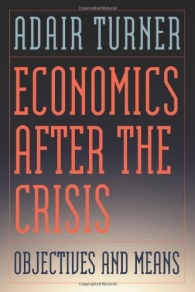 Turner is an academic turned practitioner who chairs the board of the Financial Services Authority, the agency that regulates the British financial markets. He adopts a broad perspective on the role of economics in wealthy modern societies. He questions the efficiency of contemporary financial markets, arguing that merely redistributive activities have come to outweigh creative ones, that the social contributions of finance are difficult to identify, and that many “hedging” innovations have become necessary simply to protect against instabilities created by the financial system itself — hardly a net contribution to social welfare. On a more philosophical level, he addresses a persistent puzzle: although rich people tend to be happier than poor people, they do not seem to grow happier as they grow richer over time. Turner sees an answer in the role of social status. As people earn more, they tend to spend their new discretionary income on status symbols, such as luxury goods. But status is always relative and not necessarily obtainable through spending, and hence wealthier people feel a degree of frustration even as their incomes rise. Finally, Turner makes the case that growth should not be sought as an end in itself in rich countries. Rather, the focus should be on creating economic freedom and making possible a wide range of employment opportunities.
Turner is an academic turned practitioner who chairs the board of the Financial Services Authority, the agency that regulates the British financial markets. He adopts a broad perspective on the role of economics in wealthy modern societies. He questions the efficiency of contemporary financial markets, arguing that merely redistributive activities have come to outweigh creative ones, that the social contributions of finance are difficult to identify, and that many “hedging” innovations have become necessary simply to protect against instabilities created by the financial system itself — hardly a net contribution to social welfare. On a more philosophical level, he addresses a persistent puzzle: although rich people tend to be happier than poor people, they do not seem to grow happier as they grow richer over time. Turner sees an answer in the role of social status. As people earn more, they tend to spend their new discretionary income on status symbols, such as luxury goods. But status is always relative and not necessarily obtainable through spending, and hence wealthier people feel a degree of frustration even as their incomes rise. Finally, Turner makes the case that growth should not be sought as an end in itself in rich countries. Rather, the focus should be on creating economic freedom and making possible a wide range of employment opportunities.
(Foreign Affairs)















